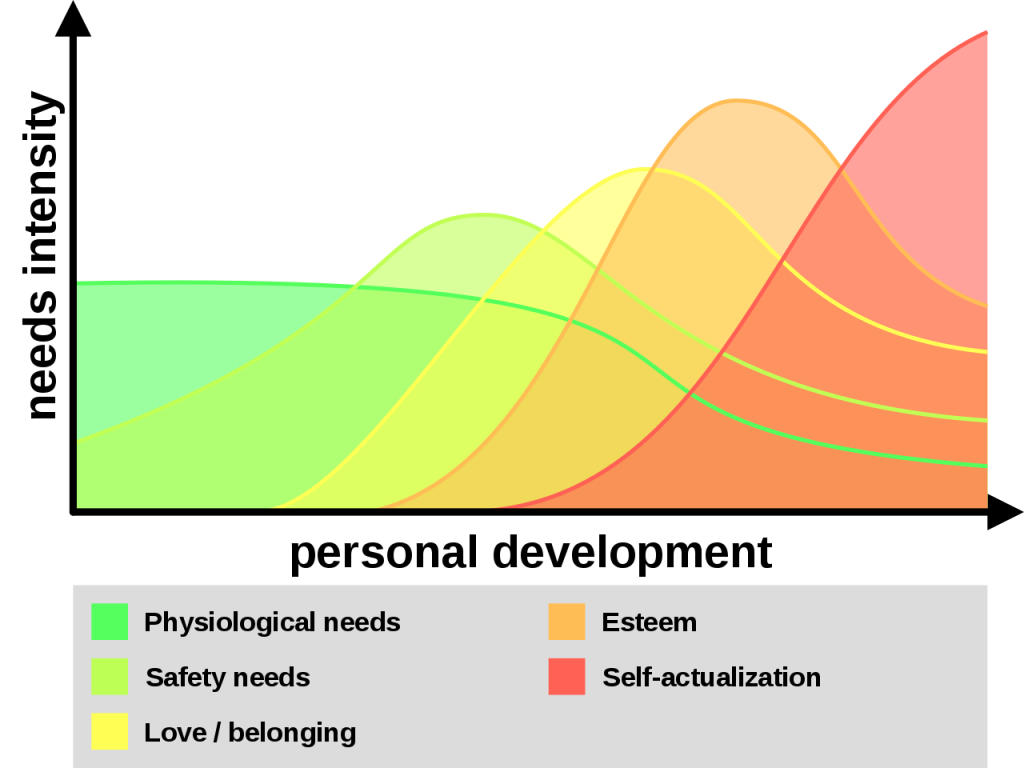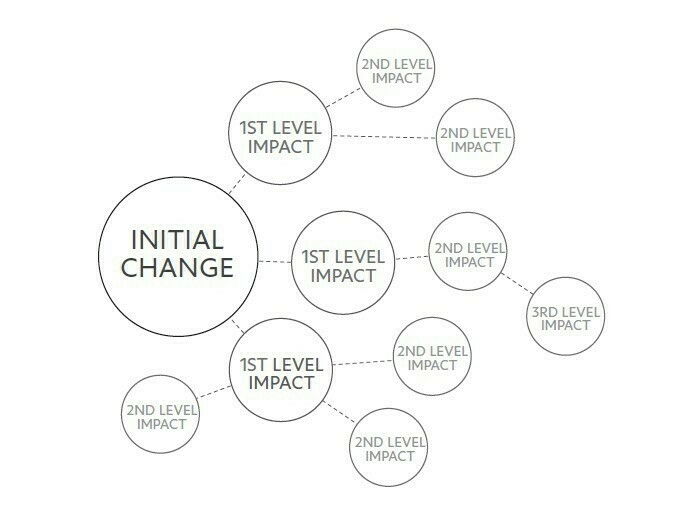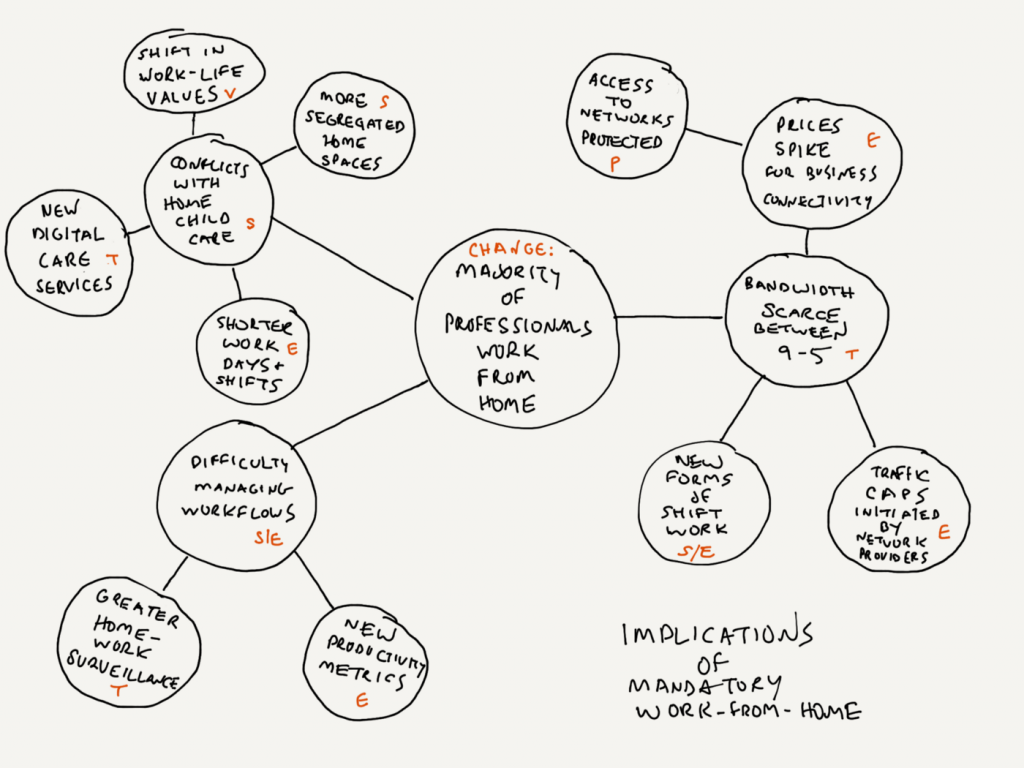- People seem not to see that their opinion of the world is also a confession of character
- We have it in our power to begin the world over again
- Working from home, and have done for a while
- Working from home, and are new to it
- Working at their usual place of work
- Not working because they are unemployed
- Not working because they are ill/retired
There is no creature whose inward being is so strong that it is not greatly determined by what lies outside it
Mental health, imagination, and post-pandemic futures
I guess, given that this is the third straight week I've written on the subject, that this could be considered a blogchain on post-pandemic reality. I'm fine with that, and although there's no need to read the previous two posts, you might want to do so for background:
In this post I want to talk about the effect of this period of lockdown on our collective mental health and ability to imagine the future.
The caveat is that I don't inhabit anyone else's brain than my own, and therefore am extrapolating from one specific example. I'm told that in statistics that's not recommended.
There are five very broad categories of people during this lockdown. You can imagine it as a spectrum, as there are those who are:
It's fair to say that the lockdown affects these groups in different ways. However, I think that they share quite a lot in common.
For people in all five groups, whatever their current status, they had plans for the future. Let's look at those out of work first: if you're ill, your plan is probably to get better; if you're retired you may have plans to visit the grandkids; or if you're unemployed the chances are you're looking forward to getting a job.
If you're employed, no matter where you work, then you're looking forward to any number of things: that promotion, the conference you're attending in a few months' time; or even just finishing the project you're working on.

Instead, you're stuck at home. And as Christine Grové points out in this article about the longer-term effects of the coronavirus on education, that can have mental health implications — what some term a 'social recession':
A social recession can have profound physical, economic and psychological effects. Though we are in uncharted territory, data suggests that quarantine can seriously affect people’s mental health, leading to anger, confusion and post-traumatic stress symptoms. As this pandemic continues, the continuous provision of mental health information is critical. Honest and fast communication about how to reduce isolation and increase connection while physically distancing is essential. Health messages need to also include specific ways to look after your mental health. As governments and health regulatory bodies respond to the impacts of the pandemic, an interdisciplinary expert task force on the short- and long-term mental health effects is urgently needed to address the potential risks and repercussions for children, youth, adults, parents, families and the community.
Christine Grové
Thankfully, thanks to an unprecedented government intervention it seems most people in the UK don't need to worry about being out on the streets. They're covered in some way. Meanwhile, the Spanish government is apparently planning to roll out basic income, not temporarily, but in a way "that stays forever, that becomes a structural instrument, a permanent instrument".
We're all familiar with Maslow's hierarchy of needs as represented as a pyramid, but these days it tends to be represented in sociological research in a more dynamic way, with overlapping needs that can take precedence at any given time.

Philipp Guttmann)
I guess what I'm trying to say is that it's great that most people in developed countries are going to be able to have their safety needs met throughout this crisis. What's not certain is that psychological needs will be met, never mind those around belonging, esteem, and self-actualization.
That's because the short version of the problem with the world pre-pandemic is 'capitalism' but the slightly longer and more accurate version is 'neoliberal capitalism'. That modifier is an important one.
Writing in The Financial Times, author Arundhati Roy writes about India's response to the coronavirus. She explains how it could be a great leveller:
Whatever it is, coronavirus has made the mighty kneel and brought the world to a halt like nothing else could. Our minds are still racing back and forth, longing for a return to “normality”, trying to stitch our future to our past and refusing to acknowledge the rupture. But the rupture exists. And in the midst of this terrible despair, it offers us a chance to rethink the doomsday machine we have built for ourselves. Nothing could be worse than a return to normality.
Arundhati Roy (The Financial Times)
Normality for too many people in this world is predicated on a logic that enriches a very small number of people while hollowing-out the world for the 99%. This is done through markets and competition being introduced to every area of life, so that 'success' or 'failure' in life is reduced to an individual's responsibility.

Under such conditions, neoliberal societies are geared towards short-termism, as evidenced by our woeful response to the dangers of climate change. As Dark Matter Labs put it:
Our underlying structural capacities and incentives are deeply coded to advance short-term thinking and decision-making. This fundamental societal deficit in future-oriented thinking, permeates our psychological, cultural, technological, legal, financial and political infrastructures—amplifying a bias towards the present—resulting in short-sighted and vulnerable subjects, short-term financial investments, waste economies and a growing political fracture between intergenerational relations.
Dark Matter Labs
This is an unprecedented opportunity for societies to change track and to get off the neoliberal rails. One way of doing that is to use tools to think about the potential impact of the changes we're experiencing. Only then can we think about potential solutions that benefit the many instead of the few.
In a preview for a new book coming out soon, Scott Smith explains a simple technique to map impacts and implications:

He gives the example of the majority of people in 'professional' occupations now working from home. What are the first, second, and third level impacts? What kind of impacts are they?

Some of these are positive impacts, some negative, and some neutral. Some have individual effects, some are felt at the organisational or societal level. Either way, now is probably a good time to be thinking about a new venture that will both help people and be profitable in the post-pandemic landscape.
One thing we've taken for granted over the last couple of decades is that everything is manufactured in China. However, Matt Webb has been reading the runes and thinking about this:
The hegemony of manufacturing in China is assumed. But my feeling is that the threshold between centralised and local is a fine line, and it's closer than it looks.
I was reading recently about loo paper, because of course I was. Apparently it's always made close to the place of sale because it's cheap and not very dense and so disproportionately expensive to ship. So where else are these fine lines, and how quickly could we tip over them?
Matt Webb
We no longer live in a world where there are defined groups of people that neatly fit previous pre-conceived media groups. I can remember reading about DINKYs (Dual Income No Kids Yet) back when I was doing Media Studies as a GCSE student. The world has moved on.
But now we've got micro-targeted advertising and e-commerce. It's absurd to stock physical stores with items that probably won't be bought, just to make a particular size and colour available. And there's no ABC1 sociodemographic group now, people form their own communities. You can launch a micro-brand on Instagram in an instant (and either keep it niche or scale it to billions). Where's the requirement for mass anything? The logic collapses.
So maybe the logic supporting centralised supply chains has collapsed too.
Matt Webb
There's many people coming together to think through the implications of the coronavirus and what a post-pandemic landscape could (or should) look like for them and their sector. One I found particularly illuminating was on Subpixel Space, where Toby Shorin had a chat with his friends and shared the result.

I don't agree with all of the predictions, but a few really jumped out at me. For example:
Media and content brands with membership models will likely do very well, as will games, both indie and platforms like Roblox. We’ll see more brands which do not hold any assets whatsoever, but are simply groupings of individuals giving themselves a name and a presence.
Toby Shorin, Drew Austin, Kara Kittel, Kei Kreutler, Edouard Urcades
I think this is already happening. For example, a few educators banded together to create the (now quite slick-looking) Higher Ed Learning Collective. This started with one guy sitting on his couch creating a Facebook group.
Given all of the digital tools at our disposal, there's no reason for people to wait in order to experiment, or even to gain financing for their idea. In fact, getting people in on the ground floor is a great way of sharing ownership of the project.
Building brands around shared ownership with customers will probably be increasingly important. Expect to see more crowdfunding, patronage, community, and membership-based go-to-market strategies which make ownership an explicit part of the brand experience. Several crypto-adjacent teams are exploring this territory already.
Toby Shorin, Drew Austin, Kara Kittel, Kei Kreutler, Edouard Urcades
We've spent the last decade living most of our social lives online out in the open. That's becoming less and less tenable now that pretty much everyone is online. We're collectively looking for smaller spaces to share ideas with people who will read us in the right way.
There will need to be new types of interface and digital social environment to support the continued proliferation of lifestyles. We’ll probably see a flourishing of new, social micro-networks. They will not be for everyone. They will be private in nature, and will support between 20 and 1000 people.
Toby Shorin, Drew Austin, Kara Kittel, Kei Kreutler, Edouard Urcades
Although life may feel a bit boring and repetitive right now, we're in a period of time where the scale is about to tip. The thing is, we're not just not sure which way.

Although it's difficult, especially when we're feeling anxious, or lonely, or uncertain, now is the time to band together with like-minded people and to create the future we want to inhabit. Let's be the change we want to see in the world.
Enjoy this? Sign up for the weekly roundup, become a supporter, or download Thought Shrapnel Vol.1: Personal Productivity!
Quotation-as title from George Eliot. Header image by Martin Widenka.